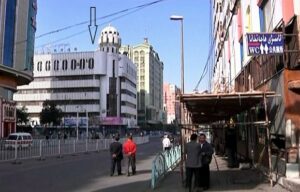
Rabia Kadir Shopping Center in Urumqi Demolished
The Rabia Kadir Shopping Center, a landmark that held great significance for the Uyghur community and the Central Asian business world, was demolished last Friday in Urumqi. Established in the 1990s, the center was a vital hub for Uyghur entrepreneurs, providing both financial and moral support. Known as one of East Turkistan’s iconic structures, the center was forced to cease operations following the July 5, 2009 events. Chinese authorities accused its owner, Rabia Kadir, of inciting the unrest and subsequently sealed off the premises.
Demolition Without Prior Notice
According to Uyghur activist Zumrat Dawut, who resides in the United States, Chinese authorities neither informed Rabia Kadir nor her family in Urumqi about the demolition. Additionally, no official explanation regarding the reason for the demolition was shared with the public. Local officials also declined to answer inquiries about the incident.
On the day of the demolition, stringent security measures were implemented. Roads and streets surrounding the shopping center were heavily monitored, and access to nearby tourist areas was restricted. Reports suggest that authorities had issued a directive to close businesses and buildings in the vicinity before the demolition.
Allegations of Explosive Demolition
Some sources claimed that the building was demolished using controlled explosions. An anonymous official stated that efforts were made to carry out the demolition “peacefully.” However, witnesses reported hearing explosions, and the heavy police presence created fear among local residents, drawing significant attention to the event.
During the demolition, all nearby shops remained closed, and the area was completely cordoned off by security forces. A local tourism bureau official later confirmed the demolition in a phone conversation.
A Cultural and Historical Loss
Built in 1990, the Rabia Kadir Shopping Center covered an area of 30,000 square meters and housed over 600 stores, conference halls, wedding venues, classrooms, and hotel rooms. It was more than just a commercial space; it served as a gathering place for nationalist intellectuals, a training ground for young scholars, and a hub for charitable activities.
International Uyghur activists emphasized that the center symbolized not only Uyghur architectural and entrepreneurial heritage but also Rabia Kadir’s political resilience during her tenure as president of the World Uyghur Congress. After in 2009, the building was sealed off, and its operations were permanently halted.
For decades, the Rabia Kadir Shopping Center brought people from across East Turkistan together, fostering community and business connections. Its demolition is regarded as a profound loss for the Uyghur community, erasing a significant symbol of their cultural and economic identity.
Source: Radio Free Asia (RFA)
